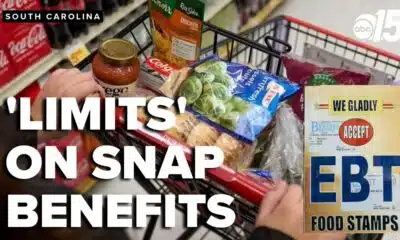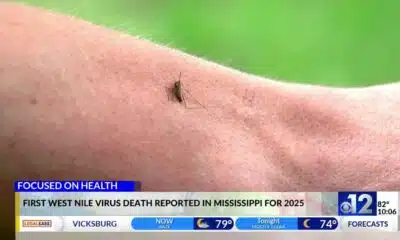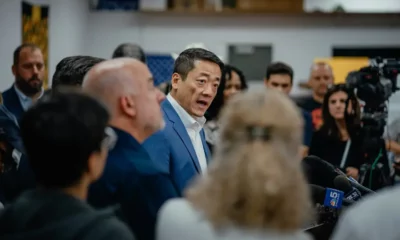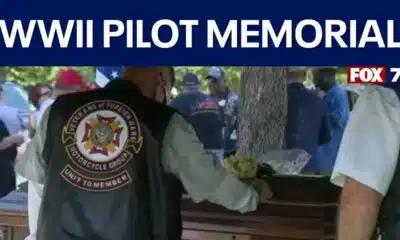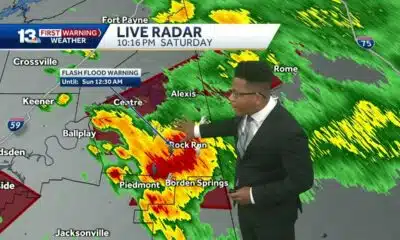News from the South - Missouri News Feed
Bank of America's Student Leaders Program
SUMMARY: Bank of America is offering a paid internship program called Student Leaders, aimed at high school juniors and seniors. This eight-week summer internship provides valuable community experience through partnerships with organizations like the United Way of Greater St. Louis. Participants will also attend a weeklong summit in Washington, D.C., focusing on the collaboration between government, nonprofits, and business sectors. Bank of America seeks passionate, community-focused students with proven leadership and long-term service records. The application deadline is approaching quickly, and those interested can apply at bankofamerica.com/studentleaders.
Bank of America Market Executive Katie Fischer joins the morning show to talk about the Bank of America’s Student Leaders Program, which is an 8-week paid internship giving students the chance to learn first-hand about the needs of the community. The program also offers an all-expense paid trip to a leadership summit in Washington, D.C. The deadline to apply is Wednesday, Jan. 15.
News from the South - Missouri News Feed
Here's what Yadier Molina said on his first game as a Cardinals coach
SUMMARY: Yadier Molina, the St. Louis Cardinals’ legendary catcher, returned to Busch Stadium as a guest coach for the first time since retiring three years ago. Serving for two games against the Chicago Cubs, Molina is providing moral support and sharing his expertise with catchers and pitchers to refine their skills during the 2025 season’s final months. He expressed joy in returning home, appreciating the fans and the opportunity to mentor young players. Manager Oli Marmol and catchers Yohel Pozo and Pedro Pages praised Molina’s presence and impact. Molina also revealed aspirations to manage or coach at the major league level in the future.
The post Here's what Yadier Molina said on his first game as a Cardinals coach appeared first on fox2now.com
News from the South - Missouri News Feed
Police found a man stabbed to death in St. Louis. They arrested his stepson in Minnesota a day later
SUMMARY: Police found 73-year-old Steven Brown stabbed to death in his North St. Louis home. Neighbors described Brown and his wife as very kind and genuine. The peaceful neighborhood was shocked when authorities arrested Brown’s stepson, 46-year-old James Minor, in Clay County, Minnesota, about 800 miles away. Minor was caught changing a flat tire when deputies arrested him; he reportedly confessed, saying, “You got me, I did it.” Minor is charged with second-degree murder and armed criminal action and awaits extradition to St. Louis. Police have not disclosed a motive for the crime. The community mourns the loss of a beloved man.
Mark Empying, the sheriff for Clay County, Minnesota, said James Minor was “attempting to change a flat tire on the side of the …
News from the South - Missouri News Feed
From SWAT raid to legal victory—man says free speech rights cleared him
SUMMARY: A man faced felony harassment charges after calling a decades-old rape victim a liar on his podcast, “Chronic Chronicles.” The St. Louis Circuit Attorney’s Office charged him with seven felonies, alleging direct contact with the victim and her family. He spent a week in jail before his public defender, Brendan Cotton Steady, uncovered that the evidence was solely from the podcast comments. Cotton Steady argued the case was a clear First Amendment free speech issue, persuading prosecutors to drop charges. The man credits his public defender and prosecutor for recognizing his rights and clearing his name, highlighting the legal victory stemming from free speech protections.
It’s an unusual case involving a very sensitive subject—a rape case from more than a decade ago that led to a conviction and sent a man to prison.
The convict is a friend of Oran Ambus, who produces a podcast called Chronic Chronicles. Ambus says he called the rape victim a liar and that later—25 cops broke down his door.
St. Louis News: FOX 2 covers news, weather, and sports in Missouri and Illinois. Read more about this story or see the latest updates on our website https://FOX2Now.com
Follow FOX 2 on social media:
YouTube: https://www.youtube.com/FOX2Now
Facebook: https://www.facebook.com/FOX2Now/
Twitter: https://twitter.com/FOX2Now/
Instagram: https://www.instagram.com/fox2now/
TikTok: https://tiktok.com/@fox2now
SnapChat: https://www.snapchat.com/add/fox2now
-
Mississippi Today5 days ago
After 30 years in prison, Mississippi woman dies from cancer she says was preventable
-
News from the South - Georgia News Feed6 days ago
Woman charged after boy in state’s custody dies in hot car
-
News from the South - Texas News Feed5 days ago
Texas redistricting: What to know about Dems’ quorum break
-
News from the South - North Carolina News Feed3 days ago
Two people unaccounted for in Spring Lake after flash flooding
-
News from the South - Florida News Feed6 days ago
Warning for social media shoppers after $22K RV scam
-
News from the South - Texas News Feed7 days ago
Texas VFW holds memorial service for WWII pilot from Georgetown
-
News from the South - Georgia News Feed6 days ago
Georgia lawmakers to return this winter to Capitol chambers refreshed with 19th Century details
-
News from the South - Alabama News Feed7 days ago
Flood Watch for Alabama: Storms linger overnight, with cooler weather in the forecast











